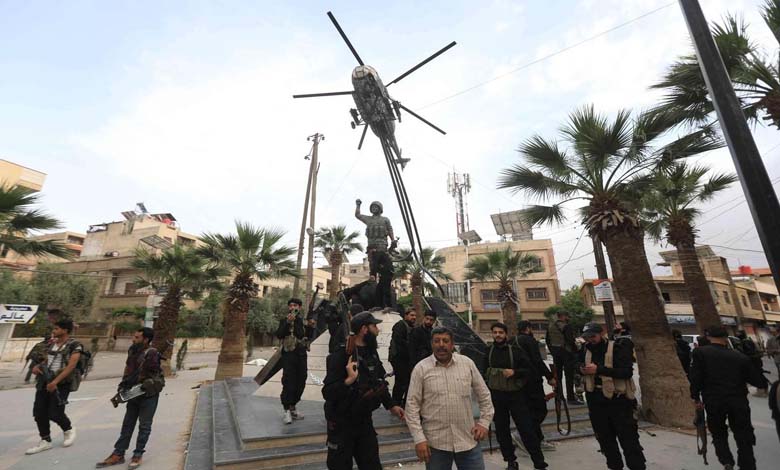Israeli Airstrikes Near Presidential Palace to Warn al-Sharaa Over Targeting Druze

Israel enters the crisis between Damascus and Druze forces in Sweida, aiming to further weaken the Syrian state under the pretext of protecting Druze and other minorities.
The Israeli army announced early Friday that it had launched airstrikes on an area adjacent to the presidential palace in Damascus. The bombardment came shortly after Tel Aviv threatened retaliatory strikes if the Syrian government failed to protect the country’s Druze minority.
-
Has al-Joulani become moderate or is he simply acting with pragmatism and caution? A political science professor responds
-
Gunmen launch attacks on Israeli army in southern Syria
This Israeli escalation clearly reflects a strategic intent to exploit the Druze issue as a means of interference in Syrian affairs, portraying Tel Aviv as the “protector” of minorities. The message to Damascus carries political weight that surpasses a standard military response, suggesting an attempt to draw new red lines deep inside Syrian territory.
This intervention is seen as exceeding the boundaries of a publicly stated “humanitarian concern,” and instead fits within a broader strategy aimed at weakening the Syrian state by fueling sectarian tensions and opening channels with parts of the local population, primarily minorities. Analysts believe Israel is using this narrative to justify military actions and expand its influence along border regions, thereby impacting internal power dynamics and deepening divisions that have persisted since the conflict began over a decade ago.
-
Has Maher al-Assad Returned to Syria? Controversy and Official Response
-
Observatory: Russia Transferred Syrian Officers to a Base in North Africa
Israeli military spokesperson Avichay Adraee said on X (formerly Twitter) that “fighter jets targeted the area adjacent to the palace of Ahmad Hussein al-Sharaa in Damascus.”
The strike followed a warning by Israeli Defense Minister Yoav Gallant, who said Israel would respond forcefully if the Syrian regime failed to protect the Druze community after deadly clashes near Damascus.
“If the attacks on the Druze resume and the Syrian regime fails to stop them, Israel will respond with considerable force,” Gallant stated.
After the Friday morning strike, Prime Minister Benjamin Netanyahu issued a joint statement with the defense minister, saying: “This is a clear message to the Syrian regime. We will not permit the deployment of [Syrian] forces south of Damascus, nor any form of threat to the Druze community.”
-
Where Are Maher al-Assad and Ali Mamlouk Hiding? What Are Their Plans?
-
“Including Syria and Lebanon”: How the Israeli Army Prepares for “Operation Winter”
Israel is home to a small Druze community, and around 24,000 Druze live in the Israeli-occupied Golan Heights, captured from Syria in the 1967 war and annexed in 1981—a move unrecognized by most countries and the United Nations.
The spiritual leader of the Druze in Israel, Sheikh Mowafaq Tarif, said late Tuesday that he was “closely monitoring” developments in Syria and had discussed them with the Israeli defense minister.
Since Monday night, Syria has witnessed sectarian clashes that have left over 100 people dead, including Druze fighters, pro-government security personnel and militiamen, and civilians, according to the Syrian Observatory for Human Rights.
-
“Al-Joulani’s Plans”: Abolishing Mandatory Military Service and Undermining Syrian Kurds
-
Maher Al-Assad Abandons Hezbollah to Avoid Israeli Strikes
The violence targeting the Druze follows last month’s bloodshed in Syria’s coastal region, which killed approximately 1,700 people, most of them Alawites. These events have exposed the difficulties facing interim president Ahmad al-Sharaa in consolidating power after the ouster of President Bashar al-Assad in December.
Sheikh Hikmat al-Hijri, one of the most prominent Druze religious leaders in Syria, described the recent incidents in Jaramana and Sahnaya near Damascus as “an unjustified extermination campaign” targeting people in their homes.
“We no longer trust a body that calls itself a government when it massacres its people through extremist militias affiliated with it, and then blames ‘uncontrolled elements’ for the massacres,” he said, adding that the state has a duty to protect its citizens.
-
Ukraine and Lebanon: Two Separate Wars That Changed Syria’s Fate
-
Iran evacuates sites in Syria in anticipation of Israeli attack
He emphasized that such “systematic mass killings” require the immediate intervention of international forces to preserve peace and stop the ongoing crimes.
His comments came after Syrian authorities announced the deployment of their forces in Sahnaya to restore order, blaming “lawless groups” for triggering the clashes by attacking security forces.
Additionally, the Syrian government announced an agreement with residents of Jaramana in the Damascus countryside to reinforce security and surrender weapons to the state. On Thursday evening, the Damascus governorate issued a statement on its official Telegram channel stating that Mohammad Ali Amer, head of the Eastern Ghouta region, met with religious and social figures in the city.
The meeting aimed to promote joint efforts to restore stability and ensure the return to normal life under state authority. The agreement includes increasing the presence of Interior Ministry security forces, the immediate surrender of heavy weaponry, restricting arms to state institutions (including unlicensed individual firearms), and setting up Defense Ministry checkpoints around the city.












